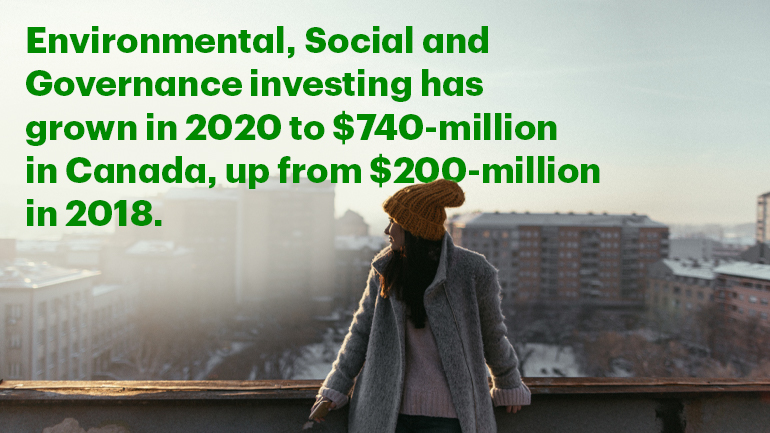Over the last few years, Damian Fernandes has been observing a shift in the investment market—a trend that began with a small group of investors a few years ago that has since ballooned into a global movement.
For many of the institutional investors that Fernandes, Vice President and Director with TD Asset Management, works with, financial returns are no longer their sole focus.
Increasingly, investors—both institutional and on an individual level—are looking to create societal change by using the power of their capital, refusing to back organizations that are seemingly unsupportive of issues such as environmental sustainability, gender equality, or movements dedicated to stamping out racial inequality.
According to TD Securities, sustainable investing – or Environmental, Social and Governance (ESG) investing – has grown in 2020 to $740-million in Canada, up from $200-million in 2018.
What's more, those numbers are expected to increase in several markets. A TD Ameritrade survey from 2018, for example, found that 60% of the American millennials polled said they viewed socially responsible investing as important (compared with 45% of investors from all age groups).
To respond to the increasing demand from consumers who want sustainability to be a core pillar of their financial choices, organizations like TD are integrating more ESG frameworks into their businesses and products.
In September, TD issued the Bank's first-ever sustainability bond. The proceeds from the US$500-million bond will be used to finance and/or refinance loans, investments and internal or external projects that are environmentally or socially responsible, such as green buildings, clean transportation, access to essential services such as healthcare, affordable housing and other eligible categories as described in the Bank's Sustainable Bonds Framework.
Other recent initiatives include, TD Asset Management Inc. (TDAM) announcing the launch of two new mutual funds and TD Securities announced the formation of a new Sustainable Finance and Corporate Transitions Group that will share research on best practices, thought-leadership and strategic advice for this area of growing client demand.
"TD was the first Canadian bank to set a bold target to finance the transition to the low-carbon economy and we've set a goal to direct 100 billion dollars in low-carbon lending, financing, and asset management by 2030 because we've long understood the power these investments have in bettering the lives of our colleagues and customers," said Norie Campbell, Group Head and General Counsel, TD Bank Group.
"The reorganization of our investment business to create an ESG advisory team of experts and the broadening of our sustainable investment suite to embed ESG deeper into our decision-making, is our next step to help solve socio-economic issues affecting the world."
Accelerating social impact from within
"People are feeling a visceral connection to the social unrest happening in the world today," said Fernandes.
The product launches also come three years after TDAM provided high net worth clients access to sustainable investments, and two years after TD introduced its ambitious corporate citizenship platform, the TD Ready Commitment, where the organization's efforts to transition to a low-carbon economy were laid out.
Broadening the investment offerings through the TD North American Sustainability Equity Fund, the TD North American Sustainability Balanced Fund, along with the bond, is part of the TD's strategy to open sustainable investment to everyone.
Societal inequities brought to light by the global pandemic and re-invigorated efforts to combat racism, said Fernandes, are also rapidly changing the internal benchmarks that determine which companies meet the stringent requirements to be included in one of the launched funds.
"More than ever, clients are looking for sustainable investments with good actors and good companies that are on top of the evolving landscape of best practices," said Fernandes. "We are building these portfolios by finding sustainability leaders and relying on our new team of experts to keep us informed of these. The companies that are contributing to social good —these are the high-quality organizations we want to focus on."
Measuring sustainability
To be selected for either of the new funds, companies must not only demonstrate quality characteristics such as strong balance sheets, improving profitability growing cash-flows, but there revenues should also be tied to achieving positive contributions towards the Sustainable Development Goals set out by the United Nations in 2015.
Some of the 17 UN goals include: commitments to inclusive economic growth, gender equality, affordable and clean energy, and demonstrating measures to help improve global food security. Fernandes said TDAM must see evidence of achievement in the benchmarks in at least one of the 17 areas set out by the UN.
Striving to make money while driving change
"The main difference between the two funds," explains Fernandes, "is that The TD North American Sustainability Equity Fund is all equities, so it potentially has higher returns, because it owns only stocks, while the TD North American Sustainability Balanced Fund owns bonds, stocks and cash. Compared to the equity version, this fund will be more conservative in its risk profile."
Fernandes said that the old misconception that investing alongside a set of values while gaining returns being viewed as more charitable giving than investing is far from the reality today.
"It's more than possible to benefit your portfolio and humanity."
Commissions, trailing commissions, management fees and expenses all may be associated with mutual fund investments. Please read the fund facts and prospectus, which contain detailed investment information, before investing. Mutual funds are not guaranteed or insured, their values change frequently and past performance may not be repeated. Mutual fund strategies and current holdings are subject to change.
Certain statements in this document may contain forward-looking statements (“FLS”) that are predictive in nature and may include words such as “expects”, “anticipates”, “intends”, “believes”, “estimates” and similar forward-looking expressions or negative versions thereof. FLS are based on current expectations and projections about future general economic, political and relevant market factors, such as interest and foreign exchange rates, equity and capital markets, the general business environment, assuming no changes to tax or other laws or government regulation or catastrophic events. Expectations and projections about future events are inherently subject to risks and uncertainties, which may be unforeseeable. Such expectations and projections may be incorrect in the future. FLS are not guarantees of future performance. Actual events could differ materially from those expressed or implied in any FLS. A number of important factors including those factors set out above can contribute to these digressions. You should avoid placing any reliance on FLS.
TD Mutual Funds and the TD Managed Assets Program portfolios are managed by TD Asset Management Inc., a wholly-owned subsidiary of The Toronto-Dominion Bank and are available through authorized dealers.

